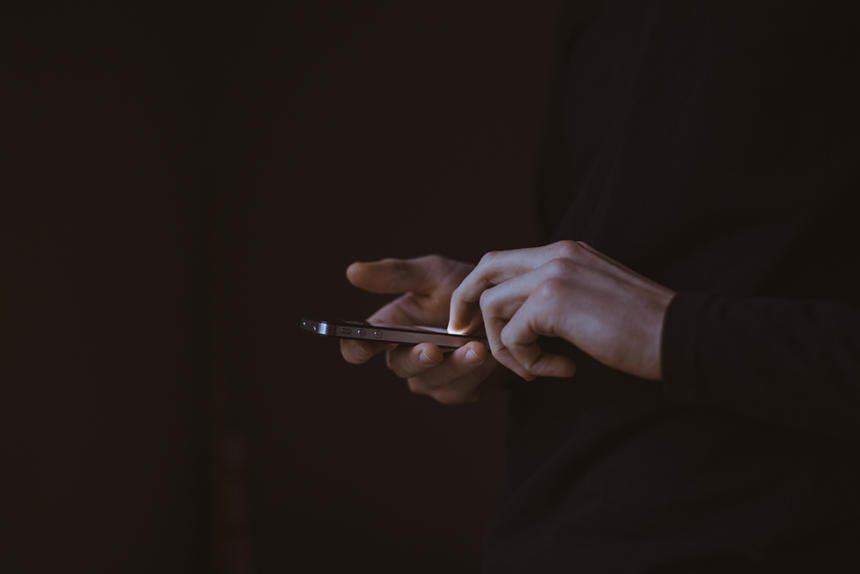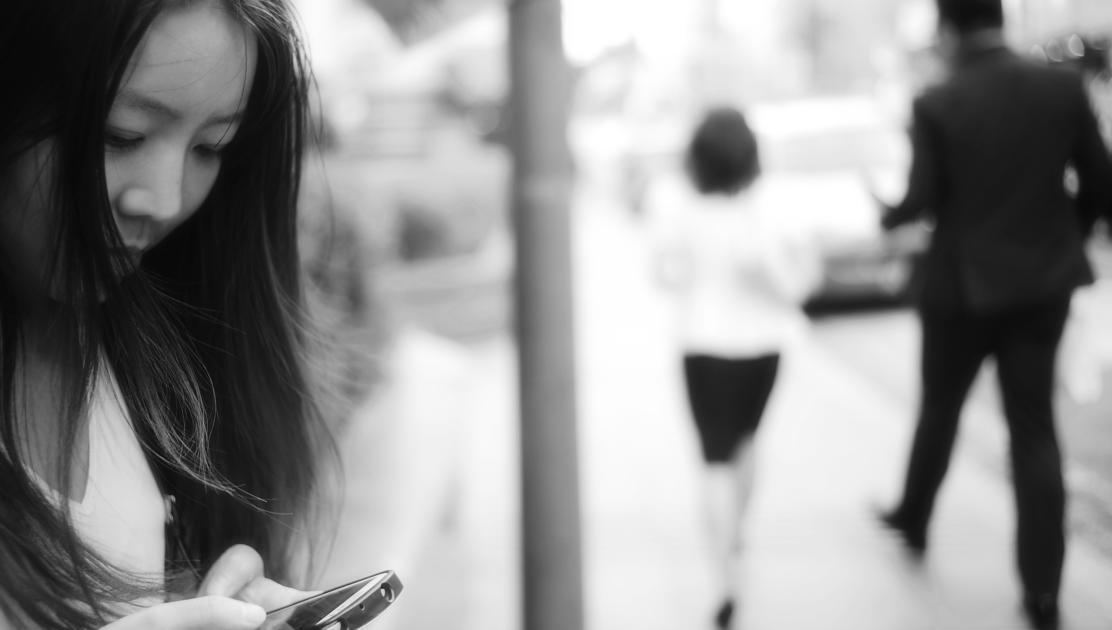Anxious to Connect
Why Social Media Use Often Leads to Difficult Emotions
By Charlotte LiebermanAccording to the gut-feelings I have in response to my regular Facebook and Instagram use, I am a lonely and unsuccessful person without authentic sources of inspiration and passion in my life.
According to my self-presentation on Facebook and Instagram, I am an extroverted and entrepreneurial writer with a laundry list of interests, creative pursuits, and professional triumphs about which to boast.
This difference is curious, but not surprising.
While a 2015 study reported that most people use social media platforms like Facebook to stay connected to their friends and family members, more recent examinations of social media’s effects on our mood have proven a bit more haunting. According to a recent study from Kapersky Lab, 42% of social media users feel an active sense of jealousy when friends’ posts and photos receive more likes than theirs; 45% of users admitted feeling “negative” in response to looking at friends’ holiday photos. A national survey from the University of Pittsburgh’s School of Medicine found that the more time young adults spent on social media, the more likely they were to report feelings of depression and isolation. The studies, surveys, and reports about the negative effects of social media are multiple, concerning everything from the correlation between social media use and divorce rates to the prevalence of disappointment among people who meet online (and therefore regard social media as a platform for deception).
Yet we’re all ostensibly participating in social media culture as a form of recreation, perhaps even pleasure. If someone asked me my reason for using Facebook and Instagram, I would say honestly that I am taking advantage of the opportunity to share and be shared with. I would explain that social media keeps me up to date on what my far-flung friends are up to, and enables me to share the minutiae of my work, social life, and creative process to the entire Internet. Sometimes when I log into Instagram, I will be greeted by a photo of my friend’s dog in Chicago (I live in New York), or a comment from my cousin on a photo of something I cooked for dinner. Moments like these make my world feel more connected, integrated, and whole.
On another level, the access to other people’s lives that social media affords us is precisely what is causing this angst and jealousy—this manageable but incessant hum of depression and isolation that so many of us can relate to. Most of the time, quite honestly, I find myself refreshing Instagram compulsively out of habit, because I have nothing else to do and am craving a distraction. Rather than feel particularly connected to any one or several individuals, I tend to feel disappointment—that my recent photo has garnered zero likes, or that the only new pieces of content in my feed are self-satisfied photos of avocado toast or French bulldogs wearing dresses. So I quickly, mindlessly find myself scrolling for something else, something more—perpetuating the cyclical chase for satisfaction to continue. My sinking mood increases my craving for a panacea, and the sustained activity only causes my mood to sink more.
Let me rewind and say I don’t think Facebook, Instagram, or any social platform specifically is to blame—nor is anyone or anything. The problem here is not social media, but our mode of relating to it, and the level of self-awareness we’re willing to cultivate about our habits. What we do (or don’t do) with that self-awareness is what holds the key to our changing our relationship to social media, and more importantly, to the feelings it can cause us to feel.

About a year ago, I spoke to research psychologist Larry Rosen, PhD, about what drives our compulsive behavior to refresh platforms like Facebook and Instagram, even when we have no particular reason to be doing so. I learned that external notifications from our phones and computers are not the number one cause for our activity. “The insidious issue here is internal,” Rosen explained. “We’ve developed a habit in our brain in which we’re worried about not catching something.” According to Rosen, we are wired to think, “Oh, it’s going to disappear from my Facebook feed and then I’ll have to go track it down; everyone else is going to respond before me, and then I’ll look like an idiot.”
What Rosen described here is often abbreviated as “FOMO”—fear of missing out. But he clarified that a more apt (but less catchy) acronym would be AOMO—anxiety of missing out. What drives our participation in social media culture is not fear but anxiety. As someone with diagnosed anxiety disorder, my hunch is that this common feeling of existential anxiety online has to do with our universal desire to be a part of something.
Of course, the irony here is glaring. We want to be a part of something, so we flock to the platforms that apparently make most of us feel depressed, isolated, and/or jealous. We have fear of missing out on social media, and yet when we use social media, we are bombarded with things we are missing out on.
When I recently asked my Facebook friends what they thought of this irony, the responses I got were fascinating, and certainly ironic given our platform for engagement. “Social media makes me feel most insecure about my career choices,” a close friend wrote. “It seems like everyone has figured out their career goals and is making progress but me.” One of my family members pointed out the bizarre coexistence of jealousy and self-awareness that social media prompts her to recognize: “People getting engaged make me feel like my eggs are shriveling and the clock is ticking,” she wrote, “But I’m in a happy relationship.” A former Tinder flame of mine summed up the inevitability of social media jealousy quite comprehensively: “Vacation pictures make me feel poor. Gym pics make me feel out of shape. University statuses make me feel old. Food pics make me hungry. Social justice statuses either make me feel uninformed or like I’m not participating enough. Invitations to events make me feel like I don’t have enough time to satisfy social obligations, and anything well-curated makes me nervous that I don’t pay enough attention to detail.”
Interestingly, several people on my Facebook wall articulated a sense of relief and solidarity at my announcing how crappy social media made me feel, and imploring them to do the same if they felt so inclined. Two people responded with the same phrase: “Let me count the ways.”
What this exercise revealed to me was that people’s self-awareness regarding social media’s negative effects is not the overarching issue here. Plenty of folks in my personal network (and across the myriad studies available) seem quite self-aware of how miserable Facebook makes them. But what they don’t seem to be doing (myself included) is recognizing the freedom that such insight can bring—particularly when we acknowledge it. Knowing the depths of negativity Facebook or Instagram can bring won’t make the bad feelings go away, but it can widen the aperture of our awareness, and actually provide us with material about which we can connect with others. We can see ourselves, each other—and all of our experiences—a little more clearly.
I don’t mean to suggest that self-awareness in a vacuum will help you quit the habit of refreshing social media incessantly. If it did, I would probably be a much happier person. But what I am suggesting is that negative emotions can be fascinating opportunities for investigation. We can ask ourselves why a certain person’s salad photographs make us feel overweight and unhealthy, or interrogate what it is about that random person from high school that continues to get under our skin? Once we gather that data, we can sit with it, and that’s where the wisdom arises.
Since the anxiety we feel about engaging on social media is widespread and culturally-contingent—not something to pathologize or attribute to ourselves as individuals—any of the answers we are able to come up with will probably resonate with friends, family members, and strangers near and far. If I learned anything from my outreach on Facebook, it was that acknowledging the negativity I feel about social media—even on social media itself—was a source of comfort for multiple people. Communicating about anxiety is a way of recognizing it, accepting it, and allowing it to exist. Allowance is a radical path to freedom.
It’s worth noting that anxiety is not necessarily deserving of the bad-rap it gets—at least not all the time. Ina Becker, MD, PhD, New York-based psychiatrist and Assistant Clinical Professor of Psychiatry at Columbia University, explained anxiety to me in terms of evolution. In the cave person days, she told me, those who were more predisposed to feel anxiety held a big tribal advantage. “They were a little more vigilant, and on the lookout for danger,” Becker clarified. “It probably helped the tribe survive, but that evolutionary advantage has gotten lost.”
No, checking Facebook regularly is not a matter of survival. But whether we like it or not, social media has become a common source of anxiety for human beings across the world, much like hunting food and protecting ourselves from predators used to be. Perhaps putting our anxiety in context of evolution can enable us to become a little bit more vulnerable with each other. And from there, we can hopefully feel a little more human in our digital experiences.
Charlotte Lieberman is a Brooklyn-based writer and editor. You can read her prose in Cosmopolitan, Guernica, The Harvard Business Review, i-D, Marie Claire,BOMB, and Refinery29 and her poetry in The Boston Review, The Colorado Review, and Nat.Brut. Follow her @clieberwoman on Twitter, or at her blog www.fatfreebalsamic.com.
Top photo courtesy of Ho JJ on Flickr. Second photo courtesy of unsplash.com.
